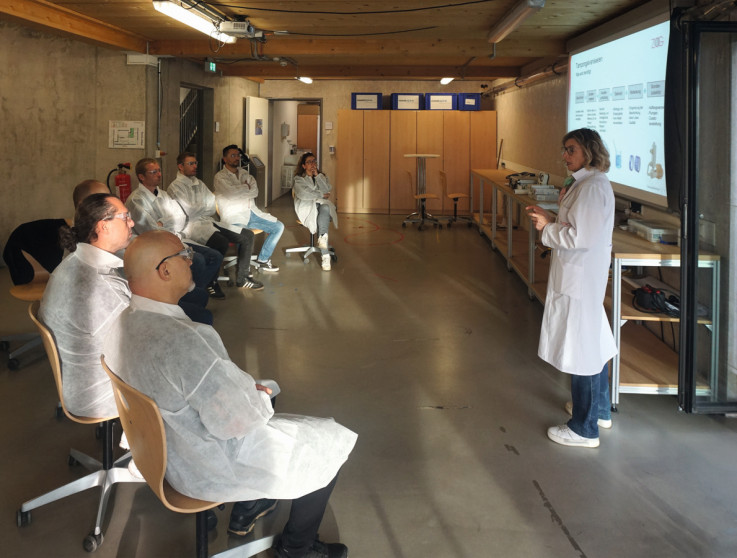Question: Like most electroplating companies and similar businesses, we have had an increasing problem finding trainees in recent years. The same applies to semi-skilled employees in production and skilled workers. At times we have been able to compensate for this trend with higher wages, but we are now reaching our limits. In addition, with every new employee and a corresponding salary, there is a risk that we will ruin the wage structure and cause ourselves further problems in the long term. We would now like to rethink our personnel policy and, for example, motivate our employees by improving their qualifications. Do you have any guidelines for us that we could build on?
The problem with trainees is probably as old as electroplating itself. On the one hand, this is due to the low level of awareness of the industry and, on the other, to the professional conditions. The handling of hazardous substances, sometimes physically demanding work, exposure to odors and noise are just some of the things that could bother potential apprentices. This has improved significantly in most companies over the last few decades, but compared to many other professions, surface technology still lags behind in terms of attractiveness - at least for the uninitiated. Improving employee qualifications is always a good idea, but in your case it only affects the people who have signed a contract. As you point out in your question, this is where it often fails. We can only support the general approach of using employee motivation to create conditions that result in staff enjoying working for you and this having a positive effect on new hires. However, this topic is very complex, which is why there are countless books on the subject. Our small guide is therefore only intended as a foundation on which you can build a house that you can fill with life.
Job description
The root lies in the job description. This is your personal understanding of what electroplating technology is and what significance it has within a process chain and - in general - in industry and modern society. Only if you are aware of this, both personally and as a company, will you be able to convey this to others.
Identification
Identification is derived from the job description. This applies above all to your company within the industry. What does your company do? Why do you do it and what are your special features and strengths? Emphasize this and try to place this idea increasingly at the center of your thoughts and actions. If you yourself are convinced or even enthusiastic about what you do, this will be transferred to existing and potential employees. You also give things a sense of purpose that hopefully goes deeper than "we have bills to pay". There are numerous good reasons to enter the honorable profession of surface coater. Highlight these in job interviews and emphasize why your company in particular is the right place to start a relevant apprenticeship, for example. Perhaps the following text will add further arguments. The same applies to unskilled staff that you would like to recruit and train. Of course, it is also about pay and many other points, but first of all people want to do meaningful things, feel useful and identify with the work. This means that they don't just galvanize or otherwise coat, they create value. Highlight how important the job is (job description) and where the coated parts are used. Knowledge management provides orientation for new skilled workers and a sustainable knowledge base in the company. In addition to suitable software tools, this also includes suitable specialist books and journals/ Photo: stock.adobe.com/ Berit Kessler
Knowledge management provides orientation for new skilled workers and a sustainable knowledge base in the company. In addition to suitable software tools, this also includes suitable specialist books and journals/ Photo: stock.adobe.com/ Berit Kessler
Working atmosphere
A key component is a good working atmosphere, which is unfortunately still underestimated. A poor working atmosphere makes most people ill in the long term, no matter how much you pay them. This is also one of the most frequently cited reasons for resignation. Employees who identify with their work and where there is a good working atmosphere are even happy to give up some money, as long as the rest is right and they feel good. Unfortunately, there are employers who believe that the work itself and a salary should be enough to motivate employees in the long term. Others, on the other hand, misunderstand a good working atmosphere and reject it because they believe that the workforce wants to be well entertained by the boss. The foundation of a good working atmosphere is mutual respect, which usually starts with the personal interaction between management and employees. You are dealing with people and you should show that. This starts with an appropriately friendly greeting, an open ear, appropriate praise and continues with respect as a person, not as a function within the company. If the management does not exemplify this, it cannot expect the same from its employees. A common idea that comes to mind in this regard is joint activities such as Christmas dinners or a summer party. This can certainly improve the working atmosphere, but only if it is already at a healthy level. If this is not the case, such measures are counterproductive. Employees are annoyed if they are fed up with work and the company all year round but are expected to put on a good mood at the Christmas party. Another key point for a good working atmosphere is a positive error culture. How do you deal with mistakes, whether they are external complaints or internal rework and other errors? Are employees shouted at and pilloried? Are the causes identified and measures taken to eliminate them or are only guilty parties sought?
People need certainties and certainties. They don't - at least not usually - do things wrong on purpose. And when mistakes happen, they need to know that their heads won't be "ripped off" straight away. Dealing with mistakes badly ultimately leads to them being covered up as much as possible. This will not only create a bad working atmosphere, but in the long run you will even have many employees who are not working for you, but against you. Dealing with pressure is another very important parameter. There is a certain amount of pressure that is good. It signals the importance of the work and drives everyone to perform well. However, most people cannot handle too much pressure. Here too, employees need security first and foremost. Constantly threatening staff with warnings and dismissals if something doesn't work out is therefore not a good idea. Instead, make sure that your management staff keep all unnecessary pressure away from employees and only pass on positive pressure. Here's a quick example: Your customer calls and needs an order very urgently. He threatens that production will come to a standstill somewhere if the order is not coated on time and calculates the enormous costs per hour of downtime. This information is important for you personally, but not for the operating personnel. They just need to know what needs to be done by when and should be supported in doing so. However, if you pass on the pressure 1:1, this often has very negative consequences. Concentration problems lead to mistakes and often even to accidents at work. In the long term, it is much better to radiate a certain calmness and composure in order to achieve your goals. If you also ensure that employees have all the resources they need to do their work well and that they receive the necessary support in an emergency, you will have achieved a great deal in terms of a good working atmosphere. Remember that rules serve people, not people serve rules.
Employee qualification
Good employee qualifications are equally valuable for employees and employers. It is an important component for motivation, the working atmosphere and personal identification. However, for this to bear fruit, the points mentioned above should be seen as a breeding ground. The qualification of personnel has many aspects and must be determined individually, for example using a qualification matrix. The right training depends heavily on the individuality of the person to be trained. Previous training, age, character and other factors play a role here. However, there are also very general measures that can help. When companies invest in their staff with further training, such as here at the Z.O.G. course "Fundamentals of Electroplating" in Schwäbisch Gmünd, this recognizes their qualifications and ensures added value and knowledge growth within the company
When companies invest in their staff with further training, such as here at the Z.O.G. course "Fundamentals of Electroplating" in Schwäbisch Gmünd, this recognizes their qualifications and ensures added value and knowledge growth within the company
Building up knowledge
A problem in many companies are the so-called "secret keepers". Knowledge of technology and problem solutions is only held by a few, often very well-paid employees. This is often justified by the fact that widely dispersed knowledge means that staff could go to the competition or become self-employed. In the long term, however, this company policy only leads to problems. Employees become insecure because they have to ask about every problem. If help is not provided immediately, this leads to further difficulties, such as delays, rework, equipment failure, etc.
To counteract this, you should build up knowledge centrally and make it accessible so that employees are able to help themselves as much as possible. This applies not only to well-written work instructions, but also to individual error tables for the individual processes and systems. You can store the documents digitally on a server and make them accessible. If necessary, it is sufficient to print them out, file them in a folder and place them at the relevant workstation. Also work with good photos and drawings so that the key points can be captured immediately. Obtain the specialist books [1] required for your company and make them accessible to your employees. The people in manual electroplating don't benefit much if the good books are on the boss's shelf. The same applies to trade magazines [2], which - like this issue - can now also be purchased digitally and by volume license [3]. Such a subscription not only serves to increase specialist knowledge in the company, but also to motivate employees.
Training courses
There are training courses that must be held annually. For example, on the subject of occupational safety. With these, but also with other training courses, there is a risk of routine. If employees are constantly presented with the same content in the same way, their attention levels will drop. Ensure good content and appropriate presentation as well as variety. Today, there are many options for proper training material. In addition to the usual internal presentations, you have the option of holding online training courses [4, 5] or bringing in external people. There are also useful tools that can support you in your daily work [6]. Create opportunities for activities on the part of the participants during training courses of any kind. These can be group work, practice questions or simple interaction. If participants are restricted to simply listening, their receptivity - and interest - will decrease over time. Training courses do not always have to last several hours or a whole day. When it comes to specific problems or new customer parts, quick training sessions of fifteen to thirty minutes are often enough to convey the key points.
Workshops
Workshops are another method of training that is particularly suitable for management staff. The most popular are problem-solving and conflict resolution workshops. This is not exclusively for the transfer of factual knowledge, but is very valuable for the team as a whole if it is well moderated. We recommend outsourcing the moderation [7] or even holding the workshop externally.
Other motivators
There are many other ways to motivate employees. Be it gifts in kind, exclusive access to attractive shopping opportunities [8] or rewards in general. You could also take this opportunity to rethink your salary model. Is it really performance-related or rather historically grown and hierarchically oriented?
An interesting approach is a reward and bonus system that is based on various achievements and accomplishments. The underlying mechanics are familiar from computer games, for example, but can also be transferred to the world of work. One possibility would be a catalog of important but often unpopular tasks that will be remunerated extra in the future. This could relate to very different activities, such as the daily calibration of equipment or the cleaning of sanitary facilities. Start by listing the tasks that employees shirk the most. Pay extra for these tasks and you will notice that staff will no longer shirk them, but will be keen to do them. In general, it can be said that it always has a positive effect if you turn a classic punishment system - which is how most employment relationships are structured - into a reward system. Just one simple example: you can tell the employee that he will be dismissed if he does not obtain a forklift driver's license. But you can also tell him that he will get more money, more varied work and an even more secure job. What do you think will motivate him more in the long term?
- B. C. -
FURTHER LINKS:
1] www.leuze-verlag.de/shop/fachbuecher-galvanotechnik
[2] www.leuze-verlag.de/fachzeitschriften/galvanotechnik
[3] www.leuze-verlag.de/fachzeitschriften/galvanotechnik/gt-abos
[4] www.galvanotechnik-for-you.de/uebersicht-kurse/
[5] www.galvanotechnik-for-you.de/uebersicht-kurse/arbeitssicherheit-in-galvaniken/
[6] www.galvanotechnik-for-you.de/galvano-rechner/
[7] www.agencybc.de/
[8] www.leuze-verlag.de/werbemoeglichkeiten/eintrag-netzwerk


